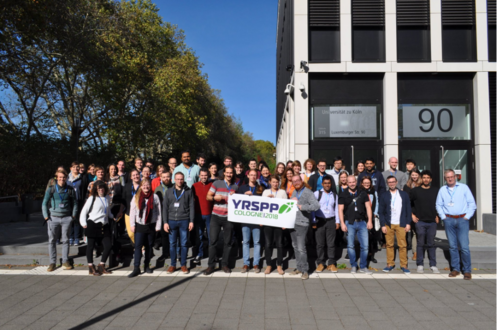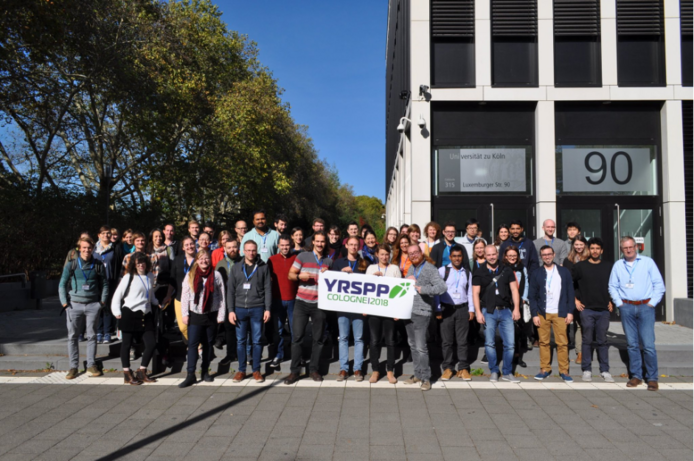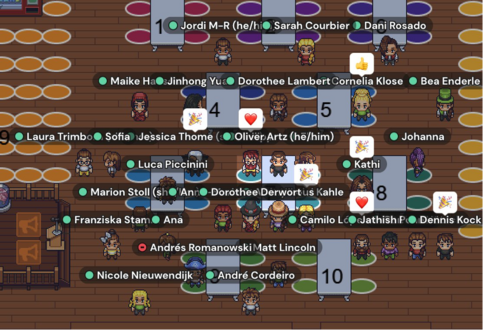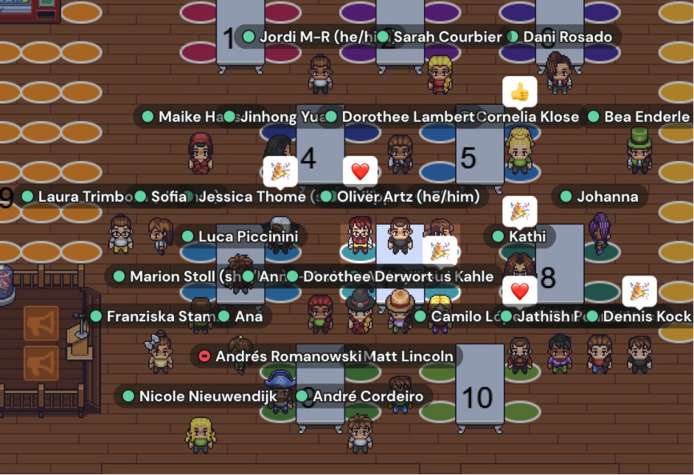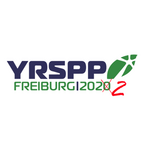The Young Researchers Symposium on Plant Photobiology (YRSPP) 2022 took place virtually to give plant photobiologists a forum to discuss their findings and foster new collaborations. For the three-day event, March 9th to 12th 2022, a group of young scientists from Glasgow, Cologne and Freiburg put together creative ways to present research and connect online with their scientific community. In a collective article, Oliver Artz (Diaz Lab, Memorial Sloan Kettering Cancer Center, NY) and Philipp Schwenk (AG Hiltbrunner, University of Freiburg) wrote down their impressions for CIBSS.


Quenching the thirst for fruitful exchanges
Sixty Early-career plant researchers gather virtually to discuss scientific progress and make new connections
The exchange of ideas and connecting with peers is a cornerstone of scientific research and an important driver of ideas. The last few years have been difficult for us as a scientific community of young researchers; conferences have been postponed or outsourced to the online space. Our community was urgently looking for alternatives.
It is particularly important for early-career scientists to spread their net and get to know what others in the field are doing to ensure future collaborations. Big conferences are often a platform for more established scientists to promote their research, whilst newcomers are pushed to the margins. We wanted to fill this gap with the second YRSPP conference.The first conference in this series took place in Cologne in 2018, sponsored by the Cluster of Excellence CEPLAS. Here, young researchers in photobiology were already given the opportunity to present their scientific ideas. However, the online format presented its own challenges.
The programme was packed with talks on all aspects of photobiology, from biochemical topics to photoreceptor dynamics, to more physiological areas such as circadian rhythms. For us organizers, it was a great pleasure to see the whole community come together. Friends we knew from previous conferences and new faces that enrich our field had scientific discussions at the highest level.
Daniele Rosado
“Poster sessions in Gather Town were the best virtual sessions I’ve ever been to.”
Getting creative to make online meetings worthwhile
We all gained experience with online meetings over the last two years: From conferences to lab meetings: many formats were experimented with online. We all learned about the advantages and disadvantages of these formats. Virtual conferences in particular left a sour taste in our mouths, as the social aspects fell far behind their real-world counterparts. With this in mind, we tried to design a programme that gave more space to social interaction: Lectures were followed by extra-long discussion blocks - and this was very well received. The question-and-answer session turned into lively discussions about the respective topic. It is always astonishing how precisely and with what high level of expertise even the young scientists questioned the speakers and what exciting impulses they provided to the field.
We were able to win three top-class keynote speakers for our conference: John Christie, Margaret Ahmad and Karen Halliday. They enriched the conference not only with their expertise, but also with their tips on career planning. In their presentations, they also gave us a historical context of their specific field and presented its current challenges.
A poster session in a virtual space
In keeping with the spirit of a "real conference", we also wanted to provide opportunities for poster presentations. Our previous experience with online poster sessions was far from satisfactory, as the asynchronous nature of the online presentation often prevented real discussion. Here we came up with the idea of using the Gather.Town service: A synthesis of online conference tool and 90s pixel art promised an almost real poster session. FRIAS made their digital institute and infrastructure available to us for this purpose. Exploring this space, meeting other participants, discussing with them and their posters felt almost real. The playful-intuitive element, including its difficulties, led to interactions that felt surprisingly real.

What is photobiology? Light triggers a developmental switch. Understanding this effect is one of the key goals of this discipline. (Picture: Prof. Dr. Andreas Hiltbrunner)
Socializing at the pub-quiz
To get to know each other better, we organized two events outside the main scientific programme. Michel, actor & quizmaster of the Vorderhaus in Freiburg, organized a pub quiz with us on the first evening, which with a lot of wit and charm almost made us forget that we were in an online event and not sitting together over a beer in a pub. On the second evening, the participants gathered for a show-and-tell where everyone had the opportunity to talk about their hobbies. It may not surprise everyone: The fun-filled event among plant researchers soon developed into a detailed conversation about the care of various house plants, which were proudly shown via webcam. Despite this realization, it was exciting to get to know the participants' respective hobbies before the third and last day of the scientific programme.
The Future of YRSPP
After more than 20 presentations, and discussion at more than 40 posters, participants democratically voted on the best presentation and poster. These went to Katharina Bursch (best presentation) and Sarah Courbier & Marissa Valdivia-Cabrera (best poster each). After a fond farewell to old and new friends, we took the smiles on faces as a sign that YRSPP 2022 was a great success. As the organization of the YRSPP is indeed a pure community effort, the continuation of this conference stands and falls with dedicated PhD students and postdocs who invest their time. And: we were more than happy that a courageous team was found to hopefully bring the YRSPP 2024 back to the real space in Utrecht, the Netherlands.
Andrés Romanowski
“We are very excited and welcome the opportunity of carrying the YRSPP flame from Freiburg to Utrecht. We want to keep this flame alive to continue fostering the current and future generations of plant photobiologists. YRSPP is a great place for networking, showcasing our work, and getting to know this beautiful community. We certainly believe that keeping this alive is worth it!”
The history of the YRSPP
The idea of the YRSPP was born in a lift in a conference center in Matsue, Japan. Some PhD students were slightly frustrated that at the most important meeting of photobiology (ISPP) young scientists played at most a minor role. They felt that the time was ripe for a meeting that would fill this gap. In 2018, the first YRSPP was held in Cologne. Here, more than 50 young researchers were able to network very successfully. Immediately afterwards, the next team was found (over beers from surprisingly small glasses) that was ready to organize the YRSPP 2020 (which fell to 2022 for pandemic reasons). This year's YRSPP was organized by Beatrix Enderle (AG Hiltbrunner, University of Freiburg), Nikolai Kahle (AG Hiltbrunner, University of Freiburg), Dorothee Lambert (former AG Hiltbrunner, University of Freiburg), Elisa Vellutini (Kaiserli Lab, University of Glasgow), Philipp Schwenk (AG Hiltbrunner, University of Freiburg) and Oliver Artz (Diaz Lab, Memorial Sloan Kettering Cancer Center, NY).
This event would not have been possible without the support of CIBSS, the Freiburg Institute of Advanced Studies (FRIAS) and the Institute of Biology II of the University of Freiburg. All three sponsors pledged their support for an analogous conference in 2020, unaware that a global pandemic was imminent. We as organizers had to struggle with the ever-changing framework conditions until we finally decided to hold the YRSPP 2022 digitally. However, our sponsors stood firmly by our side and were an indispensable help for the success of our venture. Therefore, a big thank you to CIBSS, FRIAS and BioII!






